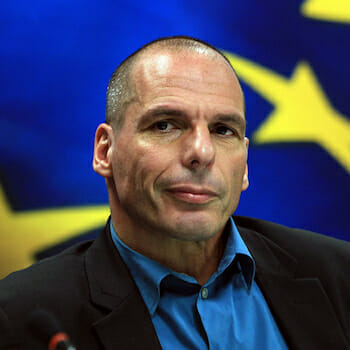
Business
Yanis Varoufakis: The Economics of Christmas
Coming out of the festive season’s hibernation (spent in Sydney), I thought it appropriate to commence the New Year with a cheeky take on the usual clash between different ‘schools’ of economics, focusing on how each of seven such ‘schools’ might view Christmas…presents. Besides the comic value of the entries below, there is a serious aspect to them: for they reveal, at least, partly, the pompousness, the self-importance, the vacuity, the dark side even of each and every economic theory.
The Neoclassicists: Consumed by their view of individuals as utility maximising algorithms, and their fixation with a paradigm of utility-driven pure exchanges, neoclassicists have no way of seeing the point in Christmas gift exchange. For one, it is a fundamentally inefficient form of exchange. When Jill receives a present from Jack that cost him $X, but which gives her utility that is less than the utility from some alternative commodity Y, which retails for $Y (that is less than or equal to $X), Jill is forced either to accept this utility loss or to embark upon the costly and usually imperfect business of exchanging Jack’s gift for Y. Either way, there is a deadweight loss involved. In this sense, the only efficient form of gift is an envelop containing cash.
However, since Christmas is about exchanging gifts, as opposed to one-sided offerings, what would the purpose be in Jack and Jill exchanging envelops stuffed with cash? If they contain the same amounts, they are pointless. If not, they are embarrassing to the person that has given less than the other and can damage Jack and Jill’s relationship irreparably. In this sense, the neoclassicist is drawn to the Scrooge conclusion: the best gift is no gift!
Keynesians: To prevent recessions from turning into depressions, a fall in aggregate demand must be reversed through increased investment which will only come if entrepreneurs trust that increased consumption will mop up the extra production that new investments will bring about.
In this sense, the elimination of Christmas gift exchange, or even the containment of Christmas largesse, would be a terrible thing during recessionary periods. Indeed, they might go so far as to argue that it is the role of the government to encourage gift exchanges (as long as they are purchased, as opposed to crafted or home produced), even to subsidise gift giving through sales tax reductions during the festive season.
To the extent that it is possible, Keynesians would want to have Christmas two or three times yearly during recessionary times (preferably spaced out during the year). On the other hand, Keynesians are also keen to stress the importance of reining in the government deficit, as well as overall consumption, when the economy is booming. To that effect, they might suggest a special gift or sales tax during the festive season once growth has picked up again, even to cancel Christmas when GDP grows beyond a pace consistent with full employment.
Monetarists: Convinced that the money supply is the sole tool that government should ever use, and that the government’s task is to keep average prices stable through the equilibration of the money supply vis-á-vis aggregate production, monetarists believe that the central bank ought gradually to increase nominal interest rates once summer ends and reduce them sharply every January. The changes in nominal interest rates they recommend depend on the central bank’s inflation target, the economy’s underlying real interest rate, and must reflect the rates necessary to keep the rate of change in consumption demand balanced with the rate of change in the inventories of large retailers. (Yes, it is true: Monetarists are the dullest economists that have ever walked the planet!)
Rational Expectations (Chicago School) economists: They disagree with both Keynesians and Monetarists. Their quarrel with the Keynesians is that they think that a fiscal policy stimulus of Christmas present-buying in recessionary festive seasons will not succeed in encouraging gift producers to produce more gifts. Keynesians are, in their opinion, underestimating the acumen of entrepreneurs who will not be fooled by such government intervention since they will foresee that the current increase in demand will be offset in the long run by a drop in demand for gifts in the future (as the government subsidies will turn into increased taxation and/or there will be fewer Christmases during the good times). As output will not rise, all the government subsidies and the additional Christmases will achieve is more debt and higher prices for no new output or employment.
Libertarians-Austrian economists: Supporters of Friedrich von Hayek and Ludwig von Mises have two major objections with Christmas. First, there is the illliberal aspect of the festive season: they feel that the state has no right, and no business, to force entrepreneurs to close down, against their will (for four days 25th & 26th December, 1st and 2nd January) in a fortnight. Secondly, there is the tendency of the ever-lengthening pre-Christmas consumption boom to expand credit thus causing bubbles in the toy and electronics market. In this sense, Christmas is like an annual ritual of creating bubbles during the Fall that will burst in January with potentially damaging consequences for the rest of the year.
Empiricists: Convinced that observation is our only tool against ignorance regarding economic phenomena, empiricists are certain that the only defensible theoretical propositions are to be derived by establishing empirical patterns where changes in one set of variables (the exogenous variables) constantly precede changes in another set of variables (the endogenous ones), thus establishing empirically (e.g. through Granger tests) the direction of causality. This train of thought leads them to the safe conclusion that Christmas, and a spurt in gift exchanges, is caused by a prior increase in the money supply and a ceteris paribus drop in savings.
Marxists: In societies in which profit is derived exclusively from surplus value ‘donated’ (as part of the capitalist labour process) by workers, and which reflects the capitalists’ extractive power (bequeath to them by one-sided property rights over the means of production), the Christmas tradition of gift exchange packs a dialectical significance: On the one hand, Christmas gift exchange is an oasis of non-market exchanges that points to the possibility of a non-capitalist system of distribution. On the other hand, it also acts as another opportunity for capital to usurp humanity’s finest instincts and subvert them in its own petty interest so as to boost its own returns through the commodification and cheapening of all that is pure and good about the festive season.
As for the more purists amongst the Marxists, i.e. those who still advocate the so-called ‘law of the falling (long term) rate of profit,’ they are convinced that capital’s capacity to profit from Christmas diminishes from year to year, thus creating social and political forces which, in the long run, undermine the festive season.
